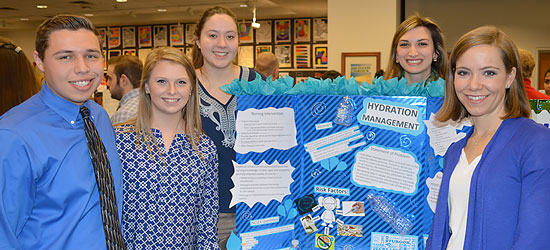
Is it safe for cardiac rehab patients to engage in rigorous exercise?
How can a nurse keep geriatric patients hydrated? And how can sustained therapy improve the gross motor function of patients with cerebral palsy?
Those were just a few topics on display at the College’s second annual Health Sciences Fair. On December 10, nearly 40 students from the departments of psychology, nursing and kinesiology presented posters and spoke about their work on a wide variety of health-related topics.
“The health sciences fair gives students the opportunity to go above and beyond classroom learning,” said psychology professor Kathy Sexton-Radek, who organized the fair. “It allows them to synthesize their experiences in the classroom, in clinicals and in research.”
Presentations at the health sciences fair featured research on SIDS, Parkinson’s, the effect of yoga on hypertension, dementia, sexuality in aging and many other topics. To create their presentations, students drew on classroom activities, internship experiences and research.
Senior Lauren von Schaumburg said her topic, High Intensity Interval Training in Cardiac Rehab, was inspired by a classroom experience. “In class we watched a video of cardiac patients using near-maximum effort in rehab,” she said. “That sounded dangerous, so I wanted to know more. For my project I looked at research into whether this kind of training can be safe for heart patients.”
Von Schaumburg did a meta-analysis of research on the topic and found that the research suggests that high-intensity training is safe for most cardiac patients. “What I learned is very relevant for me,” she said. “I did part of my clinical work with cardiac patients at Elmhurst Memorial Hospital, and it was really cool to be able to use my knowledge in prescribing exercise to my patients.”
Other projects were inspired by clinical and internship experiences.
“I never knew much about cerebral palsy, but I saw six cases during my clinical work,” said senior Nicholas Kutscher, a kinesiology major who worked with three other students to create a presentation titled Cerebral Palsy and Gross Motor Function. “I wanted to know more about how therapies can help patients with this disease.”
Sexton-Radek aims to expand the fair in future years to students in other disciplines beyond nursing, kinesiology and psychology. “We want students from any major to participate if they have an interest in a health care field,” she said. “This is a great opportunity for students to demonstrate that they can be highly successful.”














